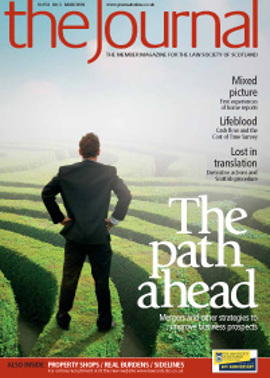Too late, too late?

Unavailability of sheriff
In Bank of Scotland v Bradbury, Edinburgh Sheriff Court, 21 January 2009, Sheriff Principal Bowen noted that if a proof commences before a sheriff who subsequently becomes unavailable to conclude the proof on grounds of ill health or death, an application requires to be made to the sheriff principal for directions as to further procedure. The sheriff principal was of the view that he saw no reason for such directions not to give the sheriff who is going to pick up the matter the ultimate decision as to whether the matter can proceed with the evidence already heard being before the court in the form of extended notes, or whether the evidence requires to be led of new.
Style of averments
There is really nothing earth shattering about the dispute in Gladys Phillips and Mary Glasgow v First Glasgow (No 1) Ltd. When Sheriff Baird issued his decision in Glasgow Sheriff Court on 1 March 2008 it was clear that the averments of duty made by the pursuers in their claim for reparation had no relevance whatsoever to the facts of the dispute. I may be being unfair, but the problem with styles is that they can result in the unwary not pausing to think what is relevant in the particular circumstances of a case.
The decision is worth a little look to see what I mean.
Unreasonable delay
In the application by Baden-Württembergische AG for an order under s 4 of the Civil Jurisdiction and Judgments Act 1982 ([2009] CSOH 19), the application was for registration of a land charge against a David Ferrier. This was opposed by Mr Ferrier on the basis that enforcement of the charge would be contrary to public interest, due to the inordinate, unexplained, and inexcusable delay on the part of the applicant in making the application. In the decision of Lord Brailsford on 12 February 2009, his Lordship accepted that there had been undoubtedly a delay and it was of such a length that it caused concern. It seemed that the bank had been aware that Mr Ferrier was in Scotland since 2001. The applicants had initially sought to register the charge in England. Their solicitors there did not point out the jurisdictional problems. However it was clear that the bank was still seeking to enforce the charge. Further, the document which was sought to be enforced represented an obligation freely entered into by Mr Ferrier. The creditor had never acted in a way as to suggest it was not seeking to enforce that obligation, and the obligation itself could well endure for a considerable period of time. There was accordingly no infringement of any ECHR right.
Late amendment
The decision from Sheriff Principal Lockhart in Mason v Jones, Ayr Sheriff Court, 21 November 2007 is an example of an application being made to amend after the sheriff had issued his decision after proof. Each case requires to be considered on its merits. The guiding principle was what was in the interests of justice. The sheriff had not been addressed on the crave which was now being sought to be amended. No findings had been made in respect of that crave. It also came too late in the circumstances.
In Donaldson v Scottish Ministers [2009] CSOH 8 (20 June 2008), Lord Woolman refused leave to amend in the course of a debate. It is an example of a case having reached a stage when any application to amend is looked at in detail. There were no details as to how any proposed amendment might remedy the defects in the pleadings; no minute of amendment had been tendered; the motion was made during a second debate, the first having been discharged as a result of a lengthy previous minute of amendment; and the arguments put forward at the debate had been contained in a note of arguments lodged over a year ago. The action had been ongoing for over two years. The party seeking leave had had ample opportunity to address the problems arising from the state of his averments.
In Link Housing Association Ltd v PBL Construction Ltd [2009] CSOH 7 the issue was whether the record should be amended to substitute one pursuer for another. This amendment was sought to be made some time after the prescriptive period had expired. However, a previous amendment had proposed to make the same change. It had been refused as a result of the submissions made by one defender who had subsequently been allowed out of the action. Lady Dorrian observed that the previous minute of amendment, although refused, had been so refused not as a result of any defect in the case against the present defenders. It had proposed to put the same issue before the court, and constituted a relevant claim for the purposes of interrupting any prescription period. In any event, by reference to authority, an amendment which is not allowed may nevertheless be sufficient to interrupt the operation of prescription.
Orders for recovery of documents
In Sovereign Dimensional Survey Ltd v Cooper [2008] CSIH 12 (sic), 28 November 2008, the Inner House considered whether the respondent was in contempt as a result of failing to comply with an order made in terms of the Administration of Justice (Scotland) Act 1972, s 1. Lord Reed, giving the opinion of the Division, considered the nature of such an order.
His Lordship observed that such an order was not a search warrant. It granted authority for the controlled recovery of evidence at the hands of a commissioner appointed by the court to secure the preservation of such evidence. Whilst a commissioner might ask the respondent as to the whereabouts of items covered by the order, the latter was not compelled to provide such information. The respondent was not placed on oath. No verbatim record was made of what was said. The present order had not been made in terms of section 1A of the 1972 Act, which gave power to order the disclosure of information as to the identity of possible witnesses or parties to proceedings. Similarly, whilst a commissioner under commission and diligence to recover documents could ask havers for details as to the whereabouts of documents, it was limited to documents. Further, any haver was cited to the commission and placed on oath.
Summary decree
It is sometimes overlooked that a motion for summary decree does not have to be aimed at the blow which provides complete success, but rather can result in certain pleas in law being repelled. In Welsh v Cowdenbeath Football Club Ltd [2009] CSOH 16, after hearing a motion for summary decree Lord Malcolm repelled certain pleas in law for the “Blue Brazil”, resulting in the dispute proceeding to the next phase but only on quantum. Clearly the defence was not as watertight as it should have been. Plus ça change!!
Expert witnesses
In J A McClelland and Sons (Auctioneers) Ltd v I R Robertson and Partners Ltd [2009] CSOH 11 Lord Hodge was moved to certify a skilled person who had not been called as a witness nor appeared on any witness list. His Lordship formed the view that whilst RCS, rule 42.13 extended the class of persons for whom certification
could be sought, such persons still required to be, or be intended to be, witnesses at an evidential hearing when regard was had to the terms of that rule. The terms of the Act of Sederunt applicable to proceedings in the sheriff court are different,but I suspect the same decision would be reached.
Joint minutes
Although perhaps a side issue, in Accountant in Bankruptcy v Brown [2009] CSIH 2, the Inner House emphasised that the terms of a joint minute are binding on the parties to that document as soon as it has been executed. It is unnecessary for the joint minute to have been lodged in court or have authority interponed thereto.
Expenses: two actions
In Lujo Properties Ltd v Schuh Ltd [2009] GWD 1-8 the pursuers had raised a further action in tandem against other defenders. The pursuers were awarded expenses in the former action, the latter action having been settled extrajudicially with expenses being dealt with on the basis of none due to or by. In a note of objections from the auditor’s decision following taxation of the expenses in the former action Lord Drummond Young recognised and applied the general principle that where expenses were awarded in proceedings against more than one defender based on substantially the same grounds, such expenses were normally apportioned amongst the defenders.
Update
Since the last article Barr Roads and Contracting v Lusk Construction Ltd (September article) has been reported at 2008 SCLR 749, Wright v Turriff Contractors Ltd (September) at 2008 SCLR 761, Zlatarits v Zlatarits (November) at 2008 SCLR 818, Moore v The Scottish Daily Record (January) at 2009 SLT 27, F M Finnieston Ltd v Ross at 2009 SLT 45 and ASC Anglo Scottish Concrete Ltd v Geminax Ltd (November) at 2009 SLT 75.
In this issue
- Corporate governance in family businesses
- Que será, será….
- A matter of form in administrations
- You may have to be mad to work here
- No standing still
- A new regime for financial advice
- United we stand?
- Watch your local trend
- Cash flow: the five essentials
- Secure our future
- Opportunity lost?
- The kilt doesn't quite fit
- We can work it out
- Asset in recovery
- Law reform update
- Be your own money saving expert
- Skeleton crew
- Ask Ash
- Only half a step
- Learning experience
- Too late, too late?
- Variations and the three year rule
- Fruits of their labours
- Death of a claim
- All part of the game
- Scottish Solicitors' Discipline Tribunal
- Website review
- Book reviews
- Just whistle while you work
- Performance review






